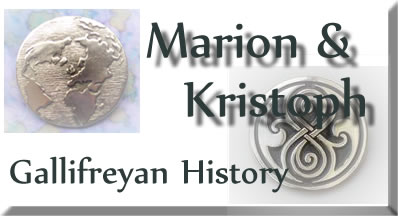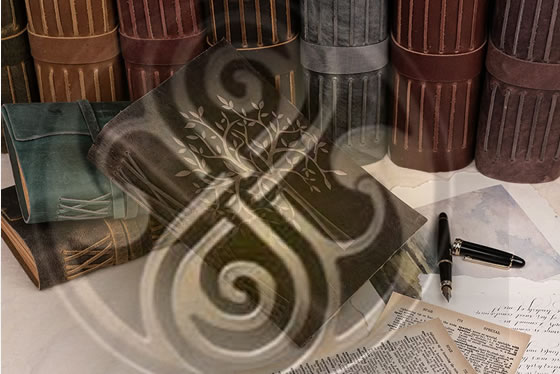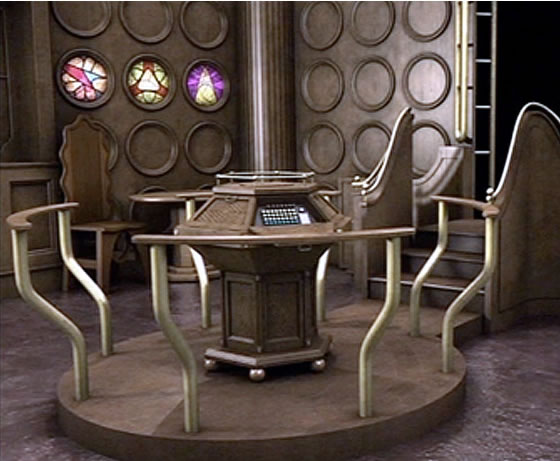

Kristoph smiled as he looked up from the TARDIS console and saw Marion. She looked so thoroughly absorbed and at peace with herself as she worked on her college assignment. She was completely unconcerned by the fact that her study was a comfortable chair in the corner of the console room with a big viewscreen showing their journey through the vortex illuminating her face as she worked.
He saw her press ‘save’ on the keyboard of the slightly anachronistic laptop he had bought for her in the year 2010.
“Half an hour and we’ll be home,” he told her.
“I’ll be glad of that,” she answered. “Kier-Rou was a lovely planet to spend the weekend on. All those gardens and flowers. Strange that there were no roses, though. They even have roses on Gallifrey, but not there. They don’t do a decent cup of tea, either.”
“No place like home,” he said. “No matter where we go in the universe, it’s always good to be home.”
“Yes,” Marion agreed. Then he saw her set aside her books on educational theory and pick up a big, leather-bound book of Gallifreyan history from his own library. That was her way of preparing for the day when Gallifrey would be her home, not Earth. She was studying the history of his society so that she could teach it to the caretaker children in the Lœngbærrow estate school.
He felt a deep pride in her effort.
“You do realise,” he said as he came and sat beside her. “The key information is taught to Caretakers and Oldblood children alike by telepathic brain bursts.
“Yes,” she answered. “I read about that. It sounds a little frightening, but I suppose it’s very efficient, really. Much easier than writing notes on a blackboard for them to copy down. But that’s only raw information. They still need teaching to use it to learn things. Information goes in. Education comes out. And so does their love of learning. That’s what matters, whether on Earth or Gallifrey. The love of learning. That’s what matters most. And Gallifreyan history is so fascinating. You have to love it.”
Kristoph laughed softly.
“When I was a student I used to be bored rigid by it. Perhaps I should have liked it better if I had you as my teacher.” He looked at the spine of the book and noted that it covered one of the very ancient periods of his world’s history. “The Dark Age. Very interesting. But Dark is the right word for it.”
“Yes,” Marion agreed. “I have been reading it. The Death Zone. That was quite chilling. The way the ancient Time Lords used their powers to kidnap slaves from ‘lesser’ races and make them fight battles for their amusement.”
“Rassilon put a stop to it. The legends speak of his ‘Wrath’ when he discovered his chosen people had used the gifts he gave them so immorally. He sealed off the Death Zone, banishing it from Time and Space.”
“That bit I didn’t understand,” Marion admitted.
“The Death Zone was a real, physical place. It existed. It could be plotted on a map. You could go there. But Rassilon removed it from that existence. It could no longer be found on a map. People who thought they knew where it was found they could not get to it. It no longer existed. It never existed. Except the memory of it and what happened there remained. To remind us that even Time Lords are capable of terrible deeds.”
“It is no worse than the Romans and their gladiator arenas,” Marion said. “And that was only about 2,000 years ago. Time Lords became civilised millions of years ago. And all because of Rassilon. He’s such a fascinating character. So powerful. So wise.” She turned to a page with a beautiful woodcut picture of Rassillon – or what an artist thought he looked like. A magnificent, tall, broad-shouldered man in a fantastically rich robe and elaborate headdress. “Good job you don’t wear clothes like that, now.”
“But we do,” Kristoph told her. “For ceremonies in the Panopticon. I have several sets of robes just like that.”
Marion looked at him and then at the woodcut. She tried to imagine him dressed that way. She wondered if it was blasphemous or something to think that he would look as magnificent as Rassilon himself.
“No,” he assured her. “Apart from anything else, the twelve Oldblood Houses are alleged to be sired by him,”
“Sired?” Marion thought about that old fashioned term. “Really? So… he’s your ancestor?”
“So the legends say. And certainly our power and position in Gallifreyan society comes from that belief.”
“Rassilon sired twelve sons,” Marion read in the book. “They in their turn became the patriarchs ofthe Twelve Ancient Houses.”
“Lœngbærrow, Ravenswode, Arpexia, Pretarion, Ixion, Ellixian, Patriclian, Arcalian, Hadandrox, Argenlunna, Stillhaeven, Borrusilan.”
Kristoph wasn’t looking at the book. He knew them from memory. Marion looked at a beautifully illuminated page with the crests of the Twelve Houses finely drawn and hand-coloured.
“The twelve sons,” she said. “Did they all have the same mother?” Again she wondered if the question was slightly blasphemous. The text was rather vague. But even on Gallifrey “siring” was a business that involved two people.
“The legend is a little hazy on that point. But I suspect Lord Rassilon indulged in a little polygamy. He WAS the founder of a new race of people, after all.”
Marion laughed before she turned back to the book and looked at the next page. Another illuminated illustration of another set of family crests, rather less elaborate, but the names still as exotic sounding. Oakdaene, Hext, Bórusson, Dúccesci...”
“Still considered Oldblood, but not of the Ancient lines of the Twelve. Lady Oakdaene regrets that very much, of course.”
Another page had even more family crests on it, smaller and even more simplified. The Newbloods. Though again the names were fantastic ones that sounded strange when she pronounced them.
“Koschei, Mírraflaex, Lundar. Chárr, D’Alba.”
“D’Alba?” Marion queried. “Lily’s name?”
“No,” Kristoph answered. “She is of the House of D’Argenlunna. Jules, her husband, was of D’Alba.”
“She married beneath her? Is that what it means? The Oldbloods, the Newbloods?”
“Only to the real snobs like the Ravenswodes and the Oakdaenes. The Newbloods are the business minds, the sharp thinkers. Most of them are as rich as the Oldbloods. Some richer. What they don’t have so much of is the political power. But they do well enough without it. Jules D’Alba was equal to any of us. Lily made a good choice, a good marriage. They were happy. The only tragedy is that they were childless. Both of their Houses will die with her. The Twelve will be reduced to nine. Ixion and Pretarion are gone already, but for different reasons.”
“Oh, that is sad,” Marion said. She didn’t want to think of Lily dying at all. But she appreciated the gravity of what Kristoph was saying.
“Funny to think that these ancient names are real, now. There are people… I’ve met some of them even… who have those names, still. You’re all a part of your history.” “So are you,” he told her. “Lœngbærrow will be your name, too. You’ll be part of that tradition.”
“Scary thought.”
“You’ll be fine. And you’re going to be a great teacher.” He smiled proudly at her before he went to initialise their final approach to Earth and rematerialisation in the car-port by their house in Liverpool. Marion watched the vortex dissolve into the beautiful view of Earth, shining brightly in the reflected sunlight. Kristoph reached for the materialisation switch. As he did so, though, a loud alarm sounded. He was so startled he jumped back away from the console. Marion looked around in terror.
“What IS it?” she asked as he switched off the sound and tried to locate the reason for the alarm.
“It’s…” He looked again to see if he was mistaken. “It’s the automatic quarantine,” he said. “When we materialise anywhere we are automatically scanned for any infection or bacteria that could be harmful to the planet we are approaching. One… or both of is… is carrying something that would be harmful to the planet Earth. The TARDIS won’t let us land.”
Marion stood and went to his side. He reached out his hand to her. She looked scared. He felt scared himself. This was an unpleasant end to their weekend trip.

 |
 |
 |